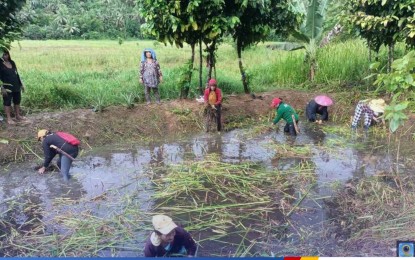
FOOD PRODUCTION. Villagers in Dolores, Eastern Samar rehabilitate a water system in preparation for planting in this May 30, 2024 photo. At least 5,840 poor families in Eastern Visayas have joined the Department of Social Welfare and Development’s (DSWD) program to mitigate the impact of food insecurity and water scarcity this year. (Photo courtesy of DSWD)
TACLOBAN CITY – At least 5,840 poor families in Eastern Visayas have participated in the Department of Social Welfare and Development’s (DSWD) program to mitigate the impact of food insecurity and water scarcity this year.
The DSWD regional office here said on Wednesday that Project LAWA (Local Adaptation to Water Access) at BINHI (Breaking Insufficiency through Nutritious Harvest for the Impoverished) covers 20 towns in four provinces of the region.
The DSWD has been holding comprehensive training encompassing disaster risk reduction, climate change adaptation, rehabilitation of water systems, communal gardening, vermicomposting, and hydroponics.
“Project LAWA at BINHI is an initiative of DSWD to address food insecurity and water insufficiency and to combat the effects of climate change, especially the El Niño that the country is currently experiencing,” the DSWD regional office said in its message sent to the Philippine News Agency on Wednesday.
The covered areas include Almagro, Matuguinao, and Sta. Margarita, Catbalogan City, and San Jose de Buan in Samar province; Catubig, Gamay, Lapinig, Silvino Lubos, and Lope de Vega in Northern Samar; Oras, Dolores, Jipapad, San Policarpo, and Maslog in Eastern Samar; and San Ricardo, Bontoc, Silago, Sogod, and Libagon in Southern Leyte.
As part of the design of Project LAWA at BINHI, the DSWD provides each partner-beneficiary with the daily minimum regional wage rate of PHP405 in exchange for their attendance at the training and participation in the implementation of the projects in their respective communities.
Recipients are paid for their attendance during the five-day training and 15 days of work.
Under Project LAWA, the DSWD focuses on enhancing water access and management in communities prone to drought and water shortages by constructing small farm reservoirs, repairing or rehabilitating water harvesting facilities, and diversifying water supplies, among others.
On the other hand, Project BINHI aims to promote food security and nutrition among communities by facilitating the adoption of climate-resilient and sustainable agricultural practices such as communal and urban gardening, vermicomposting, and the planting of disaster-resilient crops, fruit-bearing trees, and mangroves, among others.
Priority areas are those near river basins as identified by the Cabinet Cluster on Climate Change, vulnerable areas based on the climate outlook of the Department of Science and Technology—Philippine Atmospheric, Geophysical and Astronomical Services Administration, and those with the highest number of poor families based on the DSWD database. (PNA)
 The Philippine News Agency is a web-based newswire service of the Philippine government under the supervision of the News and Information Bureau (NIB) of the Presidential Communications Office (PCO).
The Philippine News Agency is a web-based newswire service of the Philippine government under the supervision of the News and Information Bureau (NIB) of the Presidential Communications Office (PCO).